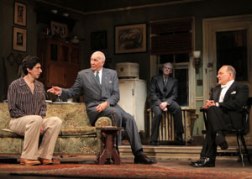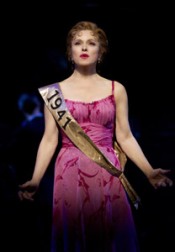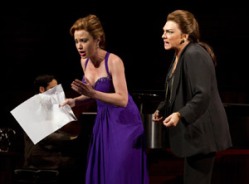Category: "Broadway"
Review: Man and Boy
Oct 10th

Terence Rattigan’s Man and Boy was written in the 1960s and is set in the 1930s, but it would unfortunately resonate in any decade. This portrait of a desperate business tycoon was inspired by an obscure, real-life figure. But modern audiences may be forgiven for thinking of a certain recently notorious Ponzi schemer while watching it.
The Roundabout Theatre Company is presenting a cannily timed revival of this largely forgotten work—a flop in its original 1963 London and Broadway productions—that offers a juicy star turn for Frank Langella.
The 73-year-old delivers a mesmerizing performance as Gregor Antonescu, a Romanian financier whose fraudulent empire is on the verge of collapsing. Pursued by both the media and the authorities, he takes refuge in the basement Greenwich Village apartment of his long-estranged son Vasily (Adam Driver), who has taken the new name of Basil Anthony.
There he intends to engage in a last-ditch effort to revive his fortunes by facilitating a merger with another company headed by Mark Herries (Zach Grenier) a closeted gay CEO who Gregor dismissively labels a “fairy.”
At first, Gregor--assisted by his loyal aide-de-camp Sven (Michael Siberry)--uses his charm and fast-talk duplicity to brush aside the arguments of Herries’ accountant (Brian Hutchison) that the numbers don’t add up. But he reserves his most shameless tactic until the end of the evening, when he dangles his attractive, bohemian son as sexual bait to entice his rival into signing off on the deal.
This is one of the more provocative if outlandish aspects of the play, which doesn’t fully succeed as either a family drama about the troubled relationship between father and son or as an indictment of ruthless capitalism. But it hardly matters, as the playwright’s gift for witty, cutting dialogue is well in evidence--it’s delivered by a first-rate ensemble under the finely tuned direction of Maria Aitken.
First and foremost, of course, is Langella, who conveys his character’s cunning, amorality and larger-than-life personality with sublimity. He relies, of course, on his forceful physical presence and booming, stentorian voice. But he also delivers a performance of masterful comic timing and physicality that is endlessly entertaining. Watch, for instance, the subtly mincing manner he suddenly adopts when trying to convince his business rival that he is secretly gay.
Equally fine is Siberry, as the loyal lieutenant who carefully looks out for his own interests every step of the way; Grenier, as the savvy businessman who succumbs to his baser instincts; and Driver, sympathetic as the son who eventually rallies to his father’s aide in spite of his own socialist leanings.
As is typical of Roundabout productions, the production elements are impeccable, particularly Derek McLane’s beautifully detailed set and Kevin Adams’ expressive lighting.
American Airlines Theatre, 227 W. 42nd St. 212-719-1300. www.roundabouttheatre.org.
Review: The Submission
Sep 30th

Playwright Jeff Talbott clearly knows the territory that he explores in The Submission. Having had his previous efforts presented at numerous theater festivals, he’s well in a position to lend verisimilitude to this darkly satirical portrait of a gay male playwright who invents a fictitious African-American female identity for himself in order to get his new work accepted by the Humana Festival.
Unfortunately, despite the sort of in-the-know references that regular theatergoers will appreciate—such as one character commenting on the commercial viability of a four character, one-set play, which this one happens to be—The Submission doesn’t exactly provide any revelations when it comes to the deeper aspect of its subject. Much like David Mamet’s Race, the main point being made here is that all of us, even liberals and minorities are, gasp, just a little bit prejudiced.
It’s not that the taut comedy/drama isn’t sharply written. Talbott has provided pungently amusing dialogue for his characters, who include struggling playwright Danny (Jonathan Groff), whose latest effort concerns a single black mother and her son struggling to survive in the projects; his lover Pete (Eddie Kaye Thomas), always ready with a wisecrack; Emilie (Rutina Wesley), the young black actress who Danny asks to assume his made-up identity of “Shaleeha G’ntamobi”; and Trevor, Danny’s friend who strikes up a relationship with Emilie.
But the well-drawn characters aren’t enough compensation for the more contrived and unbelievable aspects of the story, such as Danny’s repeated assertion that he and Emilie will become rich if their plan succeeds. Really? That will certainly come as news to most members of the playwriting profession.
The play’s certainly been given an impressively slick production courtesy of director Walter Bobbie. The performances, too, can’t be faulted, with Wesley--best known for her regular role on HBO’s True Blood--particularly compelling. But while admirable in its willingness to take on the sacred cow that is the presumed liberalism of the American theater scene, the play seems more designed to posit its intellectual arguments than provide any emotional resonance.
The Swedish Invasion: An Interview with Jonas Hassen Khemiri
Sep 27th

Last season, the Play Company’s production of Invasion! at Soho Rep left made quite an impact, garnering an OBIE award for playwright Jonas Hassen Khemiri, in his debut as a playwright. This season, Invasion! returns to New York, this time enjoying a run at Tribeca’s Flea Theater.
Invasion! is a dark comedy, nimbly colliding characters and stories while subtly ratcheting up a sense of tension and paranoia. One word, “abulkasem,” takes on diverse interpretations, leading to various situations that escalate rapidly (Invasion! is directed by Erica Schmidt and was translated by Rachel Willson-Broyles). I spoke with Khemiri, a Stockholm, Sweden, native, as the play began its run at the Flea.
ScheckOnTheArts: Where did the idea for the show come from?
Jonas Hassen Khemiri: I wanted to write a play about a magical name. I was curious about all the things you could do with a name, a word. The way people look at a name, the way people dream about a name tells us a lot about them. It says nothing and it says it all.
SOA: Invasion! is a complex play. Did anyone ask you to try and summarize it? Is it even possible for you to do so?
JHK: The play is about the notion of outside fear. The idea of there being a menace outside, and how it’s used to create an idea of a collective “us.”
SOA: And how does “abulkasem” help create that?
JHK: The Play Company questions boundaries. “Abulkasem” shows the manipulative power of words. Words are riddles, and that can be difficult for a contemporary audience. We have a rather two-dimensional image of “the other.” This play tricks the audience. People we trust turn out to be untrustworthy. Fantasies, though, are trustworthy. They tell us about people in a truthful way.
SOA: It sounds like you like challenging your audience.
JHK: I respect the audience. I want them to be careful watchers. They’re smart enough to be bombarded with multiple messages. They can’t just lean back [in Invasion!]. My actors go in and out of their roles quickly (the four-person cast, comprised of Francis Benhamou, Nick Choksi, Andrew Ramcharan Guilarte and Bobby Moreno, play numerous characters), and I love the speed of that, I love that feeling of “I missed something.” Which is not necessarily bad.
SOA: How does the process of translating your writing work?
JHK: It works very well. I met Rachel when I was visiting University of Wisconsin at Madison. It was a stroke of genius. Other translators hadn’t captured my voice and rhythms. She hadn’t translated before, but she understood the way my language moves. At this point, I view it as the text being amputated from me and put other places.
More information about Invasion! can be found at http://www.theflea.org
----- Doug Strassler
Review: Follies
Sep 13th
 It’s been a mere ten years since the last Broadway incarnation of Stephen Sondheim and James Goldman’s Follies, but that ill-conceived version was lamentable enough to warrant another revival sooner than later. Thankfully, the Kennedy Center production has now arrived at the Marquis Theatre, and this beautifully staged, acted and sung rendition might well become the must-see hit that this brilliant if problematic show has never quite managed to be.
It’s been a mere ten years since the last Broadway incarnation of Stephen Sondheim and James Goldman’s Follies, but that ill-conceived version was lamentable enough to warrant another revival sooner than later. Thankfully, the Kennedy Center production has now arrived at the Marquis Theatre, and this beautifully staged, acted and sung rendition might well become the must-see hit that this brilliant if problematic show has never quite managed to be.
Unlike the last go-around, which was populated by fine actors but less than impressive singers (Gregory Harrison, Blythe Danner, Treat Williams and Judith Ivey), director Eric Schaeffer’s production doesn’t stint on the musical aspects of this musical. Staged on a lavish scale with a full orchestra, it gloriously brings Sondheim’s magnificent score to life.
The show, set during the reunion of Ziegfeld Girls-style chorines on the occasion of their former theater being slated for demolition, was originally conceived as a murder mystery. It eventually became a bittersweet portrait of two unhappily married couples whose emotionally charged dynamics, both past and present, are eventually mirrored in a series of old-style production numbers.
The show still doesn’t quite work, for the simple reason that James Goldman’s book never makes us sufficiently care about these drab characters and their marital fates.
But its haunting evocation of a bygone era of show business and brilliant score--which includes such classics as “Broadway Baby,” “I’m Still Here,” “Could I Leave You?” and “Losing My Mind”—are ample compensation, and these elements are beautifully realized here.
Schaeffer has assembled a superb cast, including Bernadette Peters, Jan Maxwell, Danny Burstein and Jan Maxwell as the unhappy couples; Elaine Page as the diva-like Carlotta; and a gallery of theater veterans, including Jayne Houdyshell, Florence Lacey, Mary Beth Peil and Terri White as the aged chorus girls reliving their former glory.
Peters is deeply moving as the troubled Sally, and her powerful renditions of such songs as “In Buddy’s Eyes” and “Losing My Mind” demonstrate yet again her superb abilities as a Sondheim interpreter. Maxwell looks impossibly glamorous and sexy as Phyllis, even while delivering such numbers as “Could I Leave You?” with a visceral intensity. Burstein displays a winning charm as the hapless Buddy, while Raines poignantly conveys the vulnerability underlying Benjamin’s bravado. And, as might be expected, Page knocks her show-stopping number “I’m Still Here” out of the park, as well as garnering consistent laughs along the way.
Although the sterile, modern Marquis Theatre would seem an ill-fit for this show, set designer Derek McLane has effectively drabbed it down by enveloping its entire environs with somber black tarpaulin. But he provides sufficient visual opulence for the second act, when the theater comes alive for a series of lavish production numbers. Gregg Barnes’ eye-popping costumes and Natasha Katz’s frequently haunting lighting are equally effective, as is Warren Carlyle’s choreography, especially for the intricate, beautifully realized “Loveland” and “Story of Lucy and Jessie” numbers.
There are times, especially in the slow-moving opening scene, when one wonders if director Schaeffer will be up to the task. But by the end of this powerful and gorgeous new Follies, all doubts have been removed.
Marquis Theatre, 1535 Broadway. 877-250-2929, www.Ticketmaster.com.
Review: Master Class
Jul 8th

Tyne Daly has big shoes to fill in Terrence McNally’s Master Class. Not just those of her character, the legendary opera star Maria Callas, but also such esteemed forerunners in the role as Zoe Caldwell and Patti LuPone, who delivered mesmerizing turns as the imperious star in the 1995 play’s original Broadway run.
But while Daly seemingly lacks the diva-lack qualities necessary to fully embody the part, she more than delivers the goods in this Manhattan Theatre Club revival, first seen last year at Washington, D.C.’s Kennedy Center. Her Callas is perhaps less immediately commanding and formidable than her predecessors, but with the help of subtle make-up and superb technique she pulls it off in dazzling fashion.
McNally’s conceit is to show Callas teaching a master class at Julliard, something she actually did briefly in 1971 after she had stopped performing. As she interacts with several cowering and worshipful young student singers, an endlessly patient pianist, and an uncommunicative stagehand, she delivers acerbic comments about their techniques, reveals colorful anecdotes about her life and career, and occasionally loses herself in reveries in which she recalls singing her greatest roles.
The play is essentially a tricked-up version of the sort of autobiographical one-person shows that have become a theatrical staple. But it works beautifully and, as this production again demonstrates, it serves as a terrific vehicle for actresses who are up to its considerable demands.
Whether asking with mock innocence out about her supposed rivals, “How can you have rivals when no one can do what you do?”; observing of several unlucky audience members that they have “no presence”; or criticizing one of the students for having the temerity to wear an evening gown to class, Daly’s Callas is a deliciously bitchy creation.
The actress is well supported by Sierra Boggess in the role for which Audra McDonald won a Tony Award; Alexandra Silber as a tremulous young singer who can barely get a note out; and Garrett Sorenson as a big-boned tenor whose rendition of an aria from Tosca brings Callas to tears.
Stephen Wadsworth’s staging gives the proceedings a properly realistic feel, while Thomas Lynch’s shifting sets effectively convey both the modest university theater setting and the grandiose La Scala when Callas relives her past triumphs.
You don’t have to be an opera buff, although it certainly helps, to appreciate the incisive portrait that the playwright has created of one of the twentieth century’s most iconic performers. And Daly, like Caldwell and LuPone before her, delivers a commanding performance that is a master class all by itself.
Samuel J. Friedman Theatre, 261 W. 47th St. 212-239-6200. www.Telecharge.com.